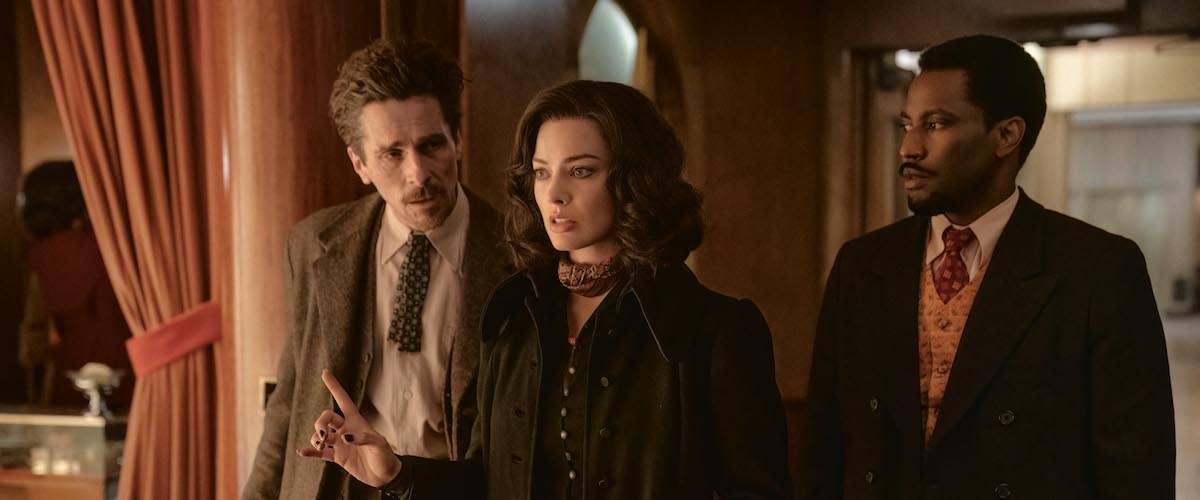By Jonah Naplan
October 6, 2022

Amsterdam
Review: Disappointing ensemble piece is poorly written and tiring.

By Jonah Naplan
October 6, 2022

“Amsterdam” isn’t nearly as bad as some critics have made it out to be, although it’s not very good either. For a 134 minute period piece directed by David O. Russell, with 15+ notable actors including the likes of Christian Bale, John David Washington, Margot Robbie, Taylor Swift, Chris Rock, Zoe Saldana, Michael Shannon, Anya Taylor-Joy, Rami Malek, Mike Myers, Robert De Niro and more, and a major studio (technically Disney at this point) harboring its production, it’s not nearly as interesting as you’d think it would be.
And it’s a shame. Because I definitely thought “Amsterdam” was going to be a major Oscars contender in the next few months, and well, I don’t think it will be anymore, to say the least. The film is one gargantuan waste of so much prestige talent, that it’s sometimes so perplexing to think about. However, it’s not like anyone in the movie gives a bad performance. In fact, the acting is probably the highlight of the movie, although the characters they’re playing, and the script that they’re given are both so by-the-numbers that the numerous solid performances seem miniscule. And if a decent performance from the great Robert De Niro seems insignificant, there’s something wrong with your movie.
“Amsterdam” —despite the title, strangely—takes place in New York in the 1930’s. It’s the story of three friends, Burt Berendsen (Bale), Harold Woodman (Washington) and Valerie Voze (Robbie) who all become suspects of a murder that we clearly see they didn’t commit. In fact, we know exactly who did commit it; “spoiler alert”: it’s a criminal played by Timothy Olyphant—in a very brief role. But don’t worry. I didn’t just reveal the movie’s biggest surprise.
The biggest surprise is associated with a second murder that isn’t marketed as much in the trailers. It’s the untimely demise of Senator Bill Meekins (Ed Begley Jr.), whose body suddenly shows up in front of Burt, needing an autopsy very quickly. We don’t know who killed the senator. The only thing we can guess is that it’s one of the characters played by one of the major actors. But considering how many major actors are in this movie, that doesn’t help much. So we have to sit through this overlong film with a very thin plot to eventually get our answer in the final twenty minutes. And the honest truth is, as the movie progressed, it became very obvious who the killer was. I won’t reveal who, but if you see the film, you’ll also probably be able to guess. That part doesn’t take a mastermind to figure out.
What does take a mastermind to figure out, however, is the correlation between each scene. “Amsterdam” often doesn’t make a lot of sense, but not because it has a thick story with multiple layers and details that need to be analyzed. It’s not intended to be complicated. It’s just always underexplained at all the wrong times. And it honestly doesn’t feel like much happens either. We know these characters got framed for a murder. But it doesn’t really feel like they’re on the run from any authorities, or that there’s any stakes about the misunderstanding itself. Between the murder and the reveal of who committed it, our three leads just basically walk around from famous actor to famous actor, telling people they didn’t kill the senator nor do they know who did, and then leave. Over and over and over again. And they don’t seem to gather any evidence either. It feels like their journey goes nowhere until a final scene at a gala. And even then, it takes narration from Christian Bale to help the audience better understand “one of the most outrageous plots in American history”—as a Google synopsis of the film calls it.
By the end of the film, the only thing I felt was that I’d been lectured at for the past two hours about why we should care about the death of a character that even our leads didn’t seem to have that big of a connection with. And yet they’re so dedicated. Dedicated to making sure that everyone knows they did not commit the murder, and that they are innocent. But the filmmakers are forgetting that while the people Bale and his friends explain this to only have to hear it once, we, as audience members, have to hear it each and every single time they do so. It’s just tedious.
“Amsterdam” opens by telling us that “A lot of this actually happened,” and while that may be true, the movie is confusing in the way that it portrays these allegedly true events. For one, the economics and politics of New York City in the 1930’s were not as squeaky clean as the movie claims they were. Considering that John David Washington plays a Black attorney, there’s surprisingly no tints of racism to be found. Obviously, a lack of racism in any world is a great thing, although if “Amsterdam” wanted to be more authentic, it really should have added more realistic aspects of life from that decade.
I thought the three friends that “Amsterdam” centered on were all charismatic and helped the movie get by without seeming like the worst thing in the world. Bale plays a doctor who specialized in wounds resulting from the war. (The film seems to reference that said war was World War I, although WWI ended an entire decade before this movie takes place). Bale wears a glass eye after losing his real one in battle alongside David Washington, who in turn, doesn’t seem to have suffered from any major injuries whatsoever. Robbie plays a nurse who attempts to pass off as a French woman in her first scene, and leaves the men in the dust when she reveals that she’s actually American. Her character ends up living in the Tom Voze (Malek) household where she develops a physical disease and hides away from the world. And somehow, I didn’t understand why such was the case. We also meet two secret intelligence agents, played by Michael Shannon and Mike Myers, that both surround a plotline that I also did not catch onto, let alone realize its importance to the story. There’s a whole side plot with Robert De Niro who apparently plays some sort of politician, and also one with Matthias Schoenaerts and Alessandro Nivola. It’s all one big intertwining confusing mess that really doesn’t seem like it has one singular goal.
“Amsterdam” is simply just a disappointing turn from David O. Russell, who seems like a director with just a rushed idea that got executed the same way it was written. Oh well. At least Taylor Swift probably got a nice paycheck.
Now playing in theaters.
"Amsterdam" is rated R for brief violence and bloody images. It's 134 minutes.
JONAHtheCRITIC.com